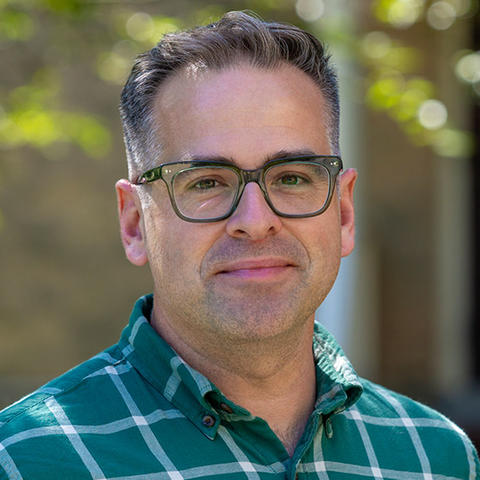Two Seniors Awarded Watson Fellowships

Details
Supported by $40,000 from the Watson Foundation, Annie Barrett and Emma Schwartz, both ’24, will embark on their global travels to explore issues of dementia care and abolition.
Two members of the class of 2024, Annie Barrett and Emma Schwartz, have joined the long list of Fords awarded prestigious Thomas J. Watson Fellowships. The program funds a year of independent exploration and global travel for newly graduated students, and Barrett and Schwartz are two of the 35 selected seniors for the 56th class of fellows. Fellows are chosen from nominations offered by 41 colleges and universities and are provided $40,000 for 12 months of travel and college loan assistance as needed.
Inspired by the close relationship she has enjoyed with her grandparents and informed by her experiences working in a memory care facility, Barrett’s project, titled “Cultural Influences on the Experience of Dementia Patients,” will explore how differing approaches across cultures inform elder care.
“By connecting with people across many cultures, I hope to gain a broader perspective of the meaning of caregiving, develop skills to better understand and meet people’s needs, and learn about alternative understandings of dementia and aging,” Barrett says of her project. “I hope this will help me live a life dedicated to caregiving and advocating for dignity and autonomy for those who cannot advocate for themselves.”
Barrett, a neuroscience major from Connecticut who plans to pursue medical school, will begin her journey in Argentina, a country, she says, that places immense value in community and collective well-being supported by universal healthcare. Her travels will take her to South Africa, Tanzania, New Zealand, Japan, and the Netherlands. Her final stop, The Hogeweyk in the Netherlands, is the site of the world’s first dementia village, which instills autonomy in patients and allows them to lead normal-seeming lives in a safe environment.
“I hope my stay in the Netherlands, a cultural environment similar to the United States, will give me the opportunity to determine whether the dementia village ethos leads to positive experiences for patients,” Barrett says.
While in Tanzania and New Zealand, she plans to live among the countries’ Indigenous populations to gain a better understanding of the efficacy of non-medical approaches and the burden of political tensions complicating the delivery of effective dementia care.
Schwartz, a comparative literature and anthropology major from Atlanta, can trace a “fundamental discomfort” with the idea of incarceration back to her childhood. Her engagement in activism and organizing began in high school and has continued during her time at the College, leading to her role as co-head of Students for Abolition, Liberation, and Transformation (SALT), the student-led prison abolition group. Schwartz says she knew she wanted to pursue a Watson Fellowship since she was a first-year.
Her project, “Abolitionist Communities,” will send her to Ecuador, Chile, New Zealand, the Philippines, and Kenya as she examines how communities and organizing efforts worldwide empower people to pursue abolitionist work and solidify connections among one another.
“As I reflected on what it is about abolition that shapes the way I connect with people and the organizing work I am drawn to — even if abolition isn’t the specific matter at hand — I realized abolitionist organizing is compelling to me because it is a process of forming deep connections of trust, care, recognition, and responsibility to co-create a world rooted in interconnectedness rather than isolation,” she says.
While in South America, Schwartz will immerse herself in the work of several solidarity networks that reflect the work of the Human Rights Coalition, a Philadelphia-based nonprofit where Schwartz has helped produce a podcast and a magazine that is delivered to thousands of incarcerated people. In New Zealand, she hopes to gain a better understanding of the ways the Māori people have brought abolitionist goals to the government, including an ambitious plan to abolish all of the country’s prisons by 2040.
“Learning from organizations around the world will allow me to draw these connections between these various struggles and better understand how so many decentralized parts make up what is understood as global resistance,” says Schwartz.
“Not only are the questions Annie and Emma plan to explore characteristic of the bold and inspiring projects the Watson Foundation aims to fund, but they themselves embody the maturity, leadership, and courage the Foundation seeks in its fellows,” says Director of Fellowships and Assessment Jason Chan. “I'm excited for them to embark on this transformative adventure and forge meaningful connections with communities around the world.”
More than 3,000 Watson Fellows have been named since the inaugural class in 1969. Since 1973, when the College began nominating students to the program, 70 Fords have received the highly competitive fellowship. With this honor, Barrett and Schwartz join an esteemed rank of fellow Fords who have applied their classroom interests to research conducted across the globe.
Watson Fellows are influential leaders in their communities and fields and include CEOs, college presidents, community organizers, Emmy-, Grammy-, and Oscar-award winners, artists, diplomats, entrepreneurs, faculty, journalists, lawyers, politicians, physicians, researchers, and influential social advocates.
Read more about Fords who have won fellowships, scholarships, or grants.




